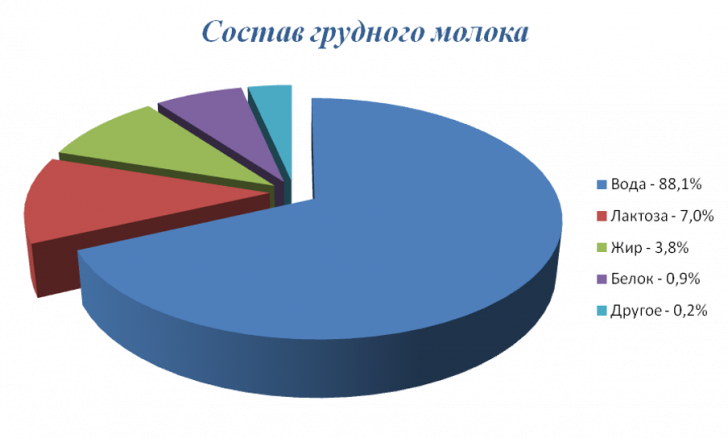Why the child does not consume breast milk

Only with mother's milk can a baby get all the substances necessary for normal growth and development.It is both food and drink( 80% of the water is water).Whether a child is breastfed is one of the main questions that confronts a young mother.
Important: in the first hours after birth, lactation may not be sufficient, however, if all recommendations are followed, it comes back to normal on the second or third day.
On the stable production of milk a woman needs to take care right after the appearance of crumbs to light.Actions of the mother should be guided by the needs of the baby.
Table of contents: Signs that a child does not consume breast milk Why does the child not have enough breast milk?What can I do to get enough of the baby?Common misconceptionsSigns that a child does not consume breast milk
There are a number of objective signs that a baby receives less breast milk than he needs.The vast majority of mothers are able to determine that the baby is hungry, already by the nature of his scream.
In addition to hungry crying, signs of malnutrition include:
-
 decreased activity( mobility) of crumbs;
decreased activity( mobility) of crumbs; - somewhat inhibited reactions;
- sucking a finger and( or) the edge of the diaper;
- smacking lips movements;
- problems with falling asleep and restless sleep;
- a pronounced reaction to the approach of the mother( including her smell);
- rare emptying of the intestine and bladder;
- slow increase in weight( or weight loss).
Defecation after each feeding is one of the main signs that the baby is getting enough food and is well absorbed by the body.
The most objective indicators can be considered an increase in body weight and "test for wet diapers."
Since breast milk is the main source of fluid for an infant, its lack can lead to some dehydration and a reduction in diuresis.In order to determine how often urination occurs, for a day you need to discard diapers. Normally, the baby can wet up to 20 or more diapers a day.If this happens less often 10-12 times a day, it may be undernourished.
Symptoms of child dehydration:
- persistent drowsiness;
- sunken eyes;
- lack of shine in the eyes;
- dryness of mucous membranes of the oral cavity;
- high viscosity( viscosities) of saliva;
- no tears when crying;
- decreased skin turgor( i.e., flabbiness);
- dry skin;
- appearance of bad breath from the child's mouth;
- urination less than 6 times a day;
- dark color and strong smell of urine.
Important: with a combination of 2 or more of the listed symptoms, you must call an ambulance team.If dehydration has developed, in order to avoid serious and life-threatening complications, qualified medical care is required, including intravenous fluid administration.
Violation of diuresis( urinary retention), even in the absence of other symptoms, is the reason for contacting a pediatrician.It is possible that there is a low functional activity of the kidneys.
The minimum weight gain on average is 125 g per week( 0.5 kg per month).It should be noted that in the first 3-5 days often there is a natural weight loss.It can be up to 10%, and is not a sign of underfeeding .During 6-7 months of life the baby can add only 300 g per month, and then it is possible to "jump" ie, an uneven increase in mass.
Weight gain is determined with routine visits to the pediatrician.It is advisable from time to time to conduct control checks at home for several days in a row.
Why does the baby lack breast milk?
The probable causes of a baby's shortage of breast milk can be divided into 3 groups:
- behavioral;
- physiological( determined by the state of the baby and mother);
- common.
Behavioral reasons:
- psychological unavailability of a woman to breastfeeding;
- violation of the technique and feeding rules( inconvenient position of the child);
- irrational( irregular and poorly balanced) mother's nutrition;
- consumption of spices and other products that cause the appearance in the milk of an unusual after-taste;
- inadequate stay of mother in the open air;
- inactivity( low motor activity).

Some mothers develop postpartum depression, manifestations of which are decreased lactation and a kind of rejection of the very process of feeding.In such cases, an experienced psychotherapist is often required.
Physiological factors that complicate the process of sucking and assimilation of milk:
- microtraumas of oral mucosa;
- nasal congestion;
- problems from the gastrointestinal tract( including colic in the abdomen).
Note: , if the child has a significant body weight( over 4 kg) at birth, malnutrition is quite possible against the background of insufficient production of breast milk.
Excessive decantation often results in hyperlactation, that is, excessive milk production.Its excess can also cause the baby not to be saturated.
Important: daily intake of breast milk is a rather conventional concept.The optimum volume depends on a number of individual characteristics.On average, a monthly infants consumes 500-600 ml per day.

It is known that breast milk consists of the front( liquid, replacing the crumbs water) and the rear( more dense and rich in nutrients).Normally, glands synthesize as much milk as the baby needs at a certain stage of development.Against the background of frequent pumping, its total volume increases, but the child consumes more than the front milk at each feeding.His stomach is filled with liquid, and there is a rapid physiological saturation, and the baby receives little nutrients at the same time.Thus, the child, in fact, remains hungry.
Important: if the baby's body is weakened, then the baby can fall asleep during sucking, and this also leads to constant malnutrition.
A child may not be full of breast milk due to an incorrect breast capture against the background of anatomical features of the mother's nipple structure( flat form).A frequent and very serious problem is often the cracked nipples that make the process of feeding painful for a woman and lactostasis( congestion in the mammary glands).
Lactation is adversely affected by lack of sleep and chronic fatigue.In some cases, the decline in milk production is due to serious hormonal disorders.
Common reasons include the unfavorable situation in the family, that is, a negative psycho-emotional background.There are often cases when other family members are not ready to change their way of life with the appearance of the baby, and do not provide the young mother with the proper support.Important negative factors are also the incorrect organization of the feeding place of the child, and insufficient rest for the mother( against the background, lactation can be reduced).
What can I do to ensure that the baby is full?
 To ensure that your baby does not stay hungry, you must strictly follow the recommendations developed by experienced pediatricians.
To ensure that your baby does not stay hungry, you must strictly follow the recommendations developed by experienced pediatricians.
Mothers need to strictly balance their diet, and take food rich in carbohydrates and proteins at least 3-5 times a day.It is necessary to exclude products that can change the taste of milk( condiments and spices), and also minimize the amount of fried and fatty foods.It is important to comply with the drinking regime, that is, consume at least 2 liters of liquid per day( preferably half of this volume is pure water).
Important: Smoking and taking even small doses of alcohol during lactation are excluded!
A lactating woman needs to get enough sleep and rest;This will allow the body( in particular - the nervous system) to fully recover .It is often necessary to take walks in the fresh air, moreover, you should walk in green areas at a considerable distance from the motorways( to avoid inhaling exhaust gases).
Natural remedies that can stimulate the milk production process( for example, broths of dill, caraway and fennel) can be taken only after consulting a doctor, as phytopreparations sometimes cause allergy in young children.
Recommended to read:It is important to strictly adhere to the feeding regime of an infant, but if it requires breast more often - you do not need to refuse.
Note: until recently it was believed that the baby should be applied to the chest strictly "by the hour" with a mandatory 6-hour break for night sleep.Currently, experts argue that mother's milk is never "too much."
If necessary, you can practice dopaivanie pre-expressed milk from the bottle. The baby must be fed not only during the day, but at night.Attachments at night( especially - in the morning) stimulate the mammary glands to a high activity during the day. If a weak child sleeps a lot, then for the next feeding it should be awakened every 3 hours in the afternoon and 5 hours at night.
 It is extremely important for a young mother to learn the correct technique of feeding;Even before childbirth, she needs to get an idea of how to put the baby to the breast, so that he normally ate and spewed less.There are several convenient positions for feeding, and it is advisable to alternate them.It is important to remember that the back, neck and neck of the baby should always be one straight line.The baby's mouth normally covers not only the nipple, but also the areola - in this case the air will not enter the digestive tract.With proper feeding, only quiet throats are heard.
It is extremely important for a young mother to learn the correct technique of feeding;Even before childbirth, she needs to get an idea of how to put the baby to the breast, so that he normally ate and spewed less.There are several convenient positions for feeding, and it is advisable to alternate them.It is important to remember that the back, neck and neck of the baby should always be one straight line.The baby's mouth normally covers not only the nipple, but also the areola - in this case the air will not enter the digestive tract.With proper feeding, only quiet throats are heard.
Note: to facilitate the process of feeding will help such an accessory as a special pillow.It allows you to give your baby the optimal position and minimize the strain on the back muscles and the woman's backbone.
Relatives and relatives should be involved as far as possible in caring for their child;Otherwise my mother will not have time for a full rest.Active support of family members will also help to create a happy psycho-emotional situation.
Improving lactation is facilitated by regular self-massage of the mammary glands( it is advisable to do a circular motion clockwise). It prevents the stagnation of milk and the development of mastitis.The breasts should be washed regularly with warm water, and with the appearance of nipple cracks - lubricate them with special softening and healing creams.For antiseptic treatment, it is recommended to use a solution of furacilin or decoction of chamomile flowers( 2 tsp to 200 ml of water).
Much attention should be paid to the organization of the place and other conditions for feeding.Optimal atmosphere will help create a quiet room with muted light and a comfortable chair.It is very important that during the meal the baby is not distracted by noise and light stimuli( including working TV, etc.).
With postpartum depression, sedatives on a natural basis will help to cure - motherwort preparations and valerian .It is allowed to take only tableted forms, but not alcoholic tinctures.To stabilize the state of the nervous system, Glycine is useful.
Common misconceptions
There are a number of misconceptions about feeding.Inaccurate data regularly appears on the Internet at forums for young mothers.Many tips can only hurt.
Remember:
-
 Weighing before and after feeding does not allow to evaluate objectively whether the baby is full.The measurement error is too large.
Weighing before and after feeding does not allow to evaluate objectively whether the baby is full.The measurement error is too large. - Should not be fed with artificial mixtures.During the next feeding, the child will consume less mother's milk, and as a result, lactation will quickly decrease.
- You can not give a baby goat or cow's milk - its still immature digestive tract is not able to adequately absorb these foods.Serious problems with the stomach and intestines can become a consequence.For the same reason, it is not recommended to introduce complementary foods in the first six months of life.
- You do not need to milk the baby with water;With milk, he normally gets an ample volume of liquid.
- The mother's consumption of a large amount of cow's milk does not affect lactation in any way.The
The supplement is justified if the child was born prematurely, but even in this case it should account for not more than a third of the daily ration.Artificial mixtures are administered if the mother shows pharmacological agents that are incompatible with breastfeeding.
Plisov Vladimir, medical reviewer



